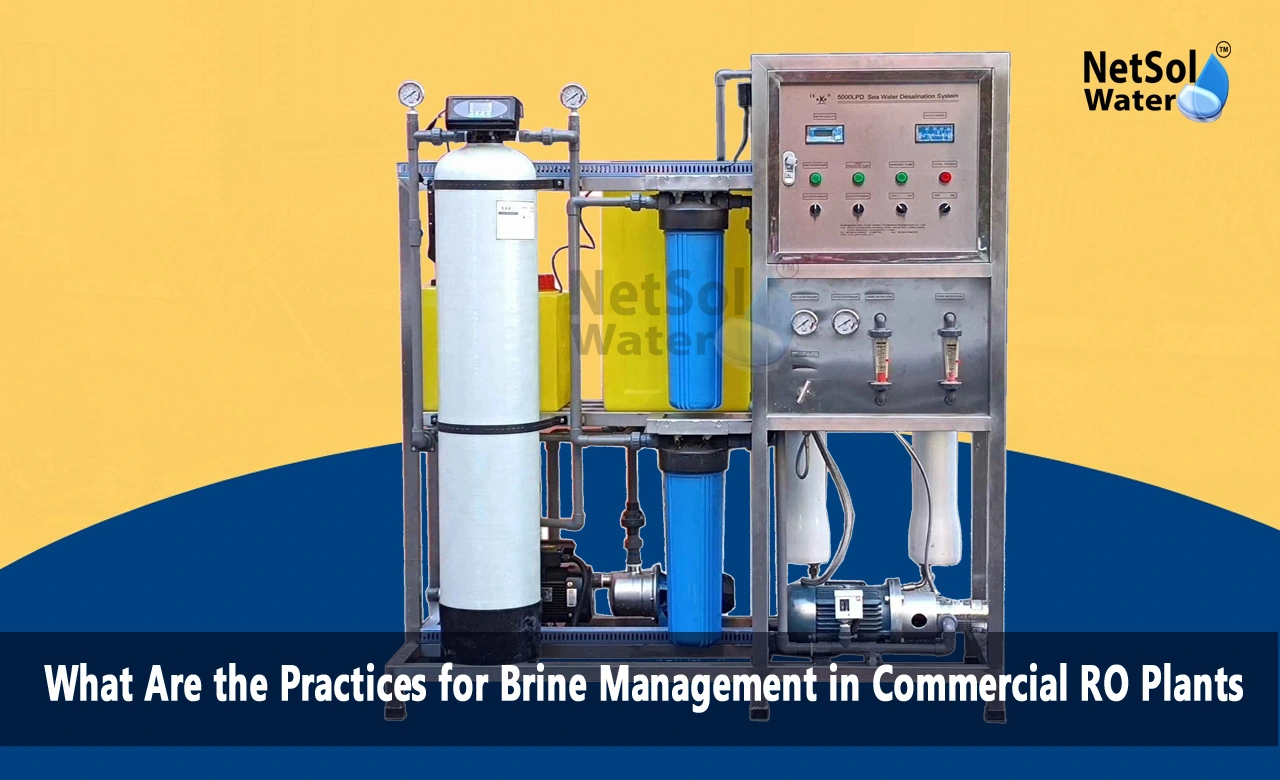What Are the Practices for Brine Management in Commercial RO Plants?
Reverse osmosis (RO) based water purification plants are becoming increasingly common for commercial and industrial applications that require a consistent supply of high-purity water. However, the RO process also generates a concentrated waste stream called brine or reject water that contains elevated levels of dissolved salts, minerals, and other contaminants. Proper brine management is crucial from both an environmental compliance and cost perspective for commercial RO plant operators.
The Brine Management Challenge
For every litre of purified water produced by RO, around 0.3 to 0.8 litres of highly saline brine reject is generated - depending on the raw water quality and RO system recovery rate. If this concentrated brine stream is improperly discharged without treatment, it can have severe detrimental impacts:
· Depletion of dissolved oxygen levels in water bodies
· Toxicity to aquatic life from high salinity
· Soil contamination affecting agriculture
· Accelerated corrosion of equipment and infrastructure
Additionally, the loss of process water through brine rejection represents a significant operational expense for commercial facilities using RO purification. Adopting sound brine management strategies is therefore imperative for sustainable RO plant operations.
Best Practices for Effective Brine Management
1. Maximize RO Recovery Rate
The volume of brine produced is directly proportional to the amount of feedwater rejected by the RO system. Maximising the recovery rate by operating the RO plant closer to its design limits reduces the overall brine volume requiring disposal.
2. Implement Brine Concentration
Using thermal or membrane-based brine concentrators enables further dewatering and minimising the total brine volume, thereby lowering disposal costs and environmental impact.
3. Explore Brine Crystallization/Solidification
Advanced zero liquid discharge (ZLD) systems involving brine crystallisers or evaporation ponds facilitate complete solid waste disposal instead of liquid brine - eliminating any risk of surface/groundwater contamination.
4. Integrate Brine Recycling
Adopting schemes where the RO brine is recycled as feed to the system inlet allows the maximum purified water to be extracted while minimising the net concentrate volume produced.
5. Consider Brine Conversion
Some industrial sectors like chlor-alkali plants can utilize RO brine as a valuable resource for their manufacturing processes instead of treating it as waste.
6. Evaluate Disposal Options
When brine discharge is unavoidable, carefully evaluate feasible disposal pathways like deep well injection, evaporation ponds, municipal sewer systems (within permissible limits), or commercial hauling - based on factors like volume, chemistry, location, and costs.
7. Deploy Instrumentation and Automation
Integration of IoT sensors, automation systems, and data analytics provides real-time visibility into brine production rates and quality. This facilitates dynamic optimisation of the overall brine management strategy.
8. Periodic Testing and Monitoring
Regularly monitor brine chemistry parameters like pH, total dissolved solids, heavy metals, etc., through accredited lab testing to ensure compliance with environmental norms at the disposal stage.
Adopting a holistic, proactive brine management program aligned with industry best practices is crucial for promoting the long-term economic viability and environmental sustainability of commercial RO plants.
Conclusion
The concentrated brine stream from reverse osmosis plants poses a significant disposal challenge that must be tackled responsibly to mitigate environmental damage and operational costs. Employing best practices like maximising RO recovery rates, brine concentration/crystallisation, recycling/conversion, and carefully evaluating disposal pathways enables commercial RO operators to develop a comprehensive brine management strategy. Additionally, leveraging automation, instrumentation, and periodic brine monitoring provides the data-driven control required for optimised brine handling on a continual basis. As water scarcity concerns escalate globally, proactive brine management will play an essential role in ensuring the sustainability and profitability of industrial and municipal ROplants.
To explore customised commercial RO plants, Industrial RO plants, ETP or STP solutions for your needs in your areas and nearby regions, contact Netsol Water at:
Phone: +91-965-060-8473, Email: enquiry@netsolwater.com



